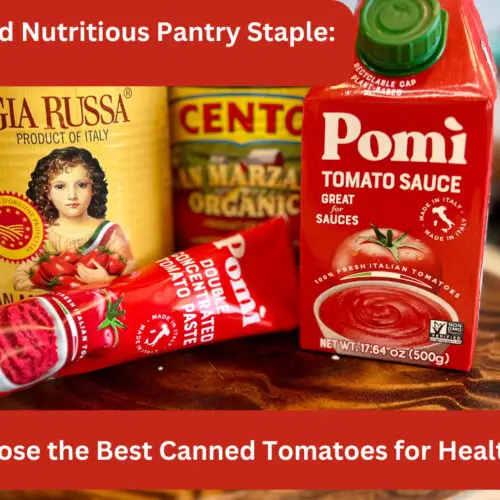The most important thing when selecting your canned tomatoes is reading the ingredients! Make sure there is no citric acid, sodium chloride, or any artificial ingredients
Whole peeled tomatoes are a staple ingredient in any pantry and for good reason. These versatile canned tomatoes are not only convenient and easy to use, but also offer a multitude of health benefits and add delicious flavor to any dish. As a result, they have rightfully earned their spot as a must-have item for home cooks and professional chefs alike.
One of the main reasons why I choose to stock only whole peeled tomatoes in my pantry is their incredible versatility. These tomatoes can be used in a variety of dishes
1. Making sauce
One of the most common uses for canned tomatoes is making sauce. Whether it’s a marinara sauce for pasta or a tomato-based sauce for seafood, canned tomatoes are the perfect base for any sauce. Puree the tomatoes in a blender or food processor and sauté them with garlic, onion, and herbs for a delicious and easy sauce.
2. Ragu
Ragu is a slow-cooked tomato-based meat sauce that is great for hearty pasta dishes. Canned tomatoes are a key ingredient in ragu as they provide a rich and robust flavor. Simply crush the tomatoes by hand or use a potato masher and let them simmer for a few hours with your choice of meat for a hearty and flavorful ragu.
3. Soup and Stews
Canned tomatoes are also great for making soups and stews. Whether it’s a classic tomato soup or a hearty Italian-style minestrone, canned tomatoes provide a great base and add depth of flavor to any soup or stew. They also work well with seafood and can be used to make a delicious seafood chowder.
4. Pizza sauce
Pizza is a classic boat meal, and canned tomatoes are a must for making homemade pizza sauce. Simply blend the tomatoes with garlic, herbs, and a pinch of salt and pepper for a quick and delicious sauce for your pizza. You can also reduce the sauce for a thicker consistency or add some tomato paste for a richer flavor.
5. Ketchup
Believe it or not, canned tomatoes can also be used to make ketchup. While it may not be the most common use, making your own ketchup on board can be a fun and creative way to use canned tomatoes. Simply blend the tomatoes with vinegar, sugar, and spices and simmer until thickened.
6. Diced tomatoes
Canned diced tomatoes are a convenient option for adding to dishes that require chunky tomatoes. However, I advise against buying canned diced tomatoes as they are treated with sodium chloride, so I recommend buying whole peeled tomatoes and dicing them yourself.
7. Marinara sauce
Marinara sauce is a staple in Italian cooking, and canned tomatoes are ideal for making it. Simply sauté garlic, onion, oregano, and red pepper flakes in olive oil, then add the canned tomatoes and let it simmer for about 30 minutes. You can use this sauce for pasta, as a pizza topping, or as a dipping sauce for bread.
Cirtus Acid is one of the most common ingredients in canned tomatoes, and it is important to find one, with the only ingredient being tomatoes, tomato purée, or. organic natural ingredients.
Citric acid is produced through a fermentation process using a type of mold called Aspergillus niger. This method is more cost-effective and easier to control, making it the most common process in the industry. The production process starts by preparing a culture medium containing sugar, nitrogen sources, and phosphate. The spores of the mold are then added to the medium and left to ferment in a warm and humid environment for several days. As the mold breaks down the sugar molecules, citric acid is produced and accumulates in the broth.
Citric acid as a food additive is not natural citric acid; it is manufactured through fermentation using Aspergillus niger.
- •
Aspergillus niger is a potent allergen.
- •
Food additive manufactured citric acid may be causing allergic inflammatory cascades.
- •
Manufactured citric acid may be contributing to the inflammation seen in asthma, juvenile idiopathic arthritis, autistic spectrum disorder, and fibromyalgia.
- •
The safety of manufactured citric acid has never been studied since it was granted GRAS status.
Below are some Amazon links, but I think there are better prices found at the grocery stores. However, not all grocery stores stock canned tomatoes without citric acid, sodium chloride, or other harmful ingredients.


